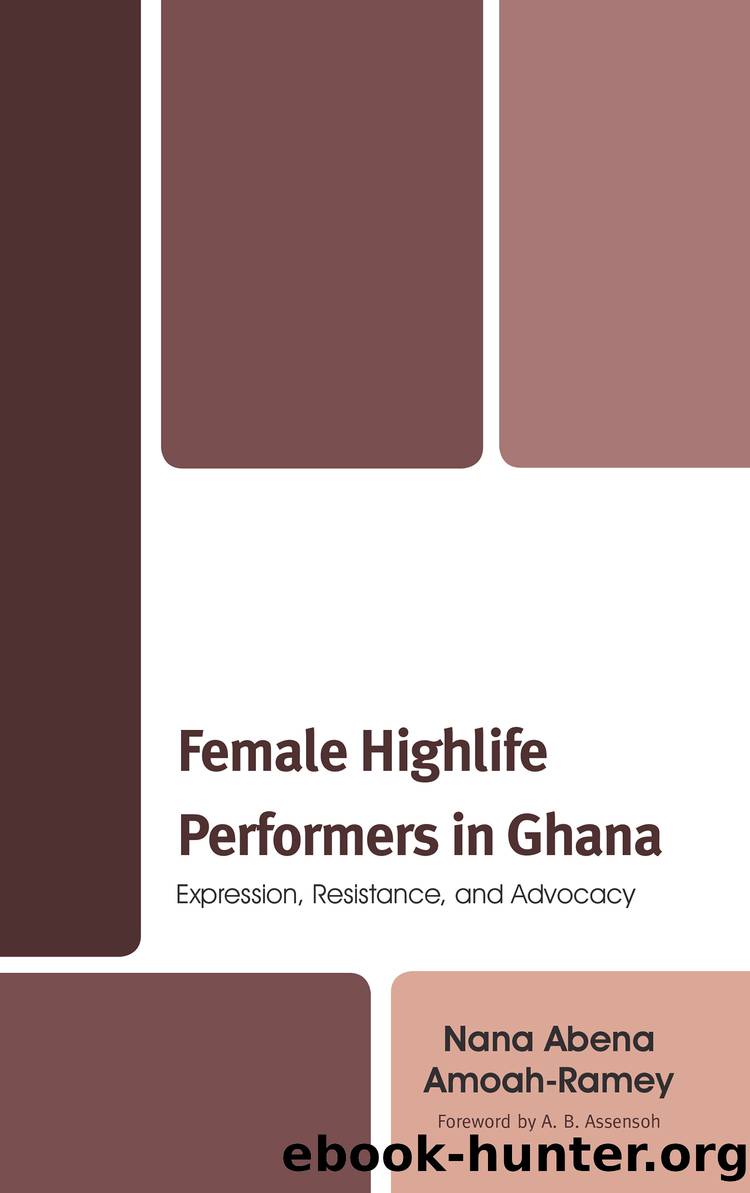Female Highlife Performers in Ghana by Amoah-Ramey Nana Abena;Assensoh A. B.;

Author:Amoah-Ramey, Nana Abena;Assensoh, A. B.; [Amoah-Ramey, Nana Abena]
Language: eng
Format: epub
Publisher: Lexington Books/Fortress Academic
Published: 2018-05-24T00:00:00+00:00
Ghanaian Womenâs Participation in the Musical Industry
Four main themes run through each of these interviews on womenâs roles in the music industry in Ghana. First, Ghanaian female musicians embrace the idea of empowerment in their music to establish and maintain the conversation within and outside the music industry. From the interviews discussed above, these female artists, despite all the forces against them, have used their lyrics to speak to issues that readily bother them and the society. Considering that colonialism gave educational access to men, enabling them to acquire highly paid jobs at the expense of womenâsâ marginalization, these female musicians have come a long way with their chosen musical careers.
Second, acquisition of education within the music industry has become a developing theme for women artists. How does one fully empower your artistic abilities? How does one improve upon musical compositions? How does one manage your musical career efficiently and be productive? Highlife artist Ms. Agyapong expresses her willingness to attend International Music Council meetings, but Professor Nketia runs it down with the issue of education. One must acquire the necessary skills to be able to reach out more. It is fine to gain a college degree of some sort, but if you mean to stay in the music business, then one should judiciously receive some music education.
Third, the contribution of the church to the making of female musicians in Ghana is alarming. It seems almost all my informants started their musical career from the church and then branched off to the secular world and then they are no longer able to go back there. Other factors which also run through here are the âscoutsâ and talent shows that help bring these female musicians out into stardom. Ms. Brew had an earlier experience with the scout talent show; Ms. Logan, Ms. Awindor, and Ms. Acheampong all together benefited from this foundational emergence of talent breeding.
Fourth, the issue of the music industry lacking structure and professionals were concerned themes throughout the discussion. Being a musician is one thing, but not having a managerial team to manage your music is very much disturbing and frustrating. Most of these female players are not doing well in the industry because they do not have support from the industry.
Everything considered, each of the interviews assisted in the telling of a complete story of Ghanaian women in Highlife music. Woven into the warps and woofs of their compositional skills are the challenging and incisive testimonies of these women. As flowers flourish in bits of soil between rocks, so will musicians grow where even the least incentive exists but where subjugation ideologies dwarf and obstruct, women cannot create music any more than flowers can grow under the shadow and weight of stones (Sophie Drinker 1948). Have subjugation ideologies dwarfed and obstructed the musical talent of these trailblazing female musicians? Let us move on to the creative compositional skills of these women and allow the unfolding pages of musical lyrics tell the tale.
Download
This site does not store any files on its server. We only index and link to content provided by other sites. Please contact the content providers to delete copyright contents if any and email us, we'll remove relevant links or contents immediately.
| Central Africa | East Africa |
| North Africa | Southern Africa |
| West Africa | Algeria |
| Egypt | Ethiopia |
| Kenya | Nigeria |
| South Africa | Sudan |
| Zimbabwe |
Goodbye Paradise(2966)
Men at Arms by Terry Pratchett(2406)
Tobruk by Peter Fitzsimons(2062)
Pirate Alley by Terry McKnight(1909)
Arabs by Eugene Rogan(1836)
Borders by unknow(1787)
Belonging by Unknown(1467)
The Biafra Story by Frederick Forsyth(1324)
It's Our Turn to Eat by Michela Wrong(1303)
Botswana--Culture Smart! by Michael Main(1238)
A Winter in Arabia by Freya Stark(1225)
Gandhi by Ramachandra Guha(1196)
Coffee: From Bean to Barista by Robert W. Thurston(1181)
Livingstone by Tim Jeal(1152)
The Falls by Unknown(1142)
The Source by James A. Michener(1135)
The Shield and The Sword by Ernle Bradford(1101)
Egyptian Mythology A Fascinating Guide to Understanding the Gods, Goddesses, Monsters, and Mortals (Greek Mythology - Norse Mythology - Egyptian Mythology) by Matt Clayton(1088)
Africa: Altered States, Ordinary Miracles by Richard Dowden(1078)
